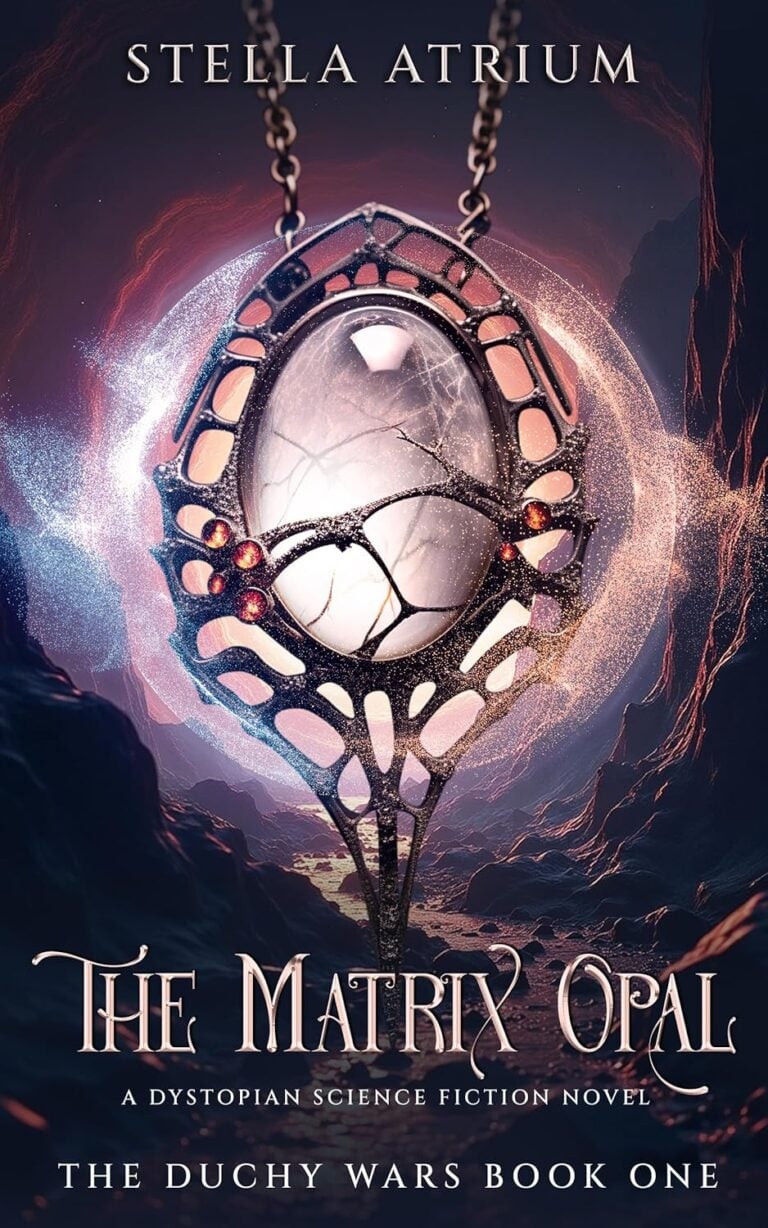 THE MATRIX OPAL: a Dystopian Science Fiction Novel received a 4+ star review, making it an IndieReader Approved title.
THE MATRIX OPAL: a Dystopian Science Fiction Novel received a 4+ star review, making it an IndieReader Approved title.
Following find an interview with author Stella Atrium.
What is the name of the book and when was it published?
THE MATRIX OPAL: a Dystopian Science Fiction Novel
What’s the book’s first line?
Mayor Orentu opened the satchel’s flap and dumped the possessions of Bybiis onto his desk.
What’s the book about? Give us the “pitch”.
A rewarding travelogue through a richly drawn world, this arresting series-starter invites new readers into the world of tribes on Dolvia with an enticing hook. As beastmaster, Bybiis may command a host of creatures. She is tortured, inked with magic-suppressing tattoos, and becomes a target of Ciska assassins.
Ariseng can make elemental wards. She agrees to join the resistance group with Bybiis the beastmaster, but only if the famous Matrix Opal is hers for magic and protection. Some warriors feel that the pair are stronger together than either is alone, but Ariseng stands her ground for her unique talents. They will be tested for loyalty and wielding powers soon enough.
What inspired you to write the book? A particular person? An event?
My intent is to break out of the princess-or-evil-queen mold. My passion is to present female characters in all roles like street kids, ranchers, teachers, doctors, warriors, militia commanders, diplomats. How do they solve real world problems using the tools that women have? And I gave them a little magic for spice.
How do women thrive in a conflict zone? The men are off fighting in the militia. The women have no weapons, no education, no access to capital, no voice in the public square. Do they band together to protect the children, or do they undercut each other?
What’s the main reason someone should really read this book?
Science fiction is written for entertainment but often adds elements that make us look at our world with fresh eyes. When the reader sees her own struggles in how the characters respond to obstacles, then I may have succeeded.
What’s the most distinctive thing about the main character? Who-real or fictional-would you say the character reminds you of?
Ariseng negotiates a price for making wards for the other tribes, haggling with warriors twice her age. She sees what each person is really asking for, and exacts the price that best suits the situation. She reminds me of a savvy street kid who knows how to make a living in a stressed situation.
When did you first decide to become an author?
When I was twelve, I told my 4 brothers that I would become a great American writer. They fell to laughing for five minutes. Role models back then were Ernest Hemingway and F. Scott Fitzgerald. And Lillian Hellman. The publishing industry has changed a great deal since then.
Is this the first book you’ve written?
THE MATRIX OPAL is Book 1 of a new series with some characters from the previous 5-book series. For example, Rufus el Arrivi is in all the previous books. We first meet him as a teenager herding cattle in THE BUSH CLINIC. For this new series, Rufus becomes a tribal leader who may allocate funds and send warriors on specific missions of defense. To encounter him again is like greeting an old friend.
How much time do you generally spend on your writing?
All my life. Experience is great fodder for characters and conflict. I do research into how societies change around strong personalities. I also look at the natural world for unique phenomenon that can be enhanced for the reader’s delight. For example, a few warriors wear a serpent pouch that is similar to a “mermaid’s purse” in our world, a folded seaweed frond with a shark fetus inside. In the series, the pouches are harvested and the fetus head drilled for a portal that allows talking between pouches.
What’s the best and the hardest part of being an indie?
The best part is also the hardest part: control. I’m in charge of cover design and finding promotional partners and how to approach readers. Of course, the demands for marketing the books take away from writing time. Sometimes it’s all overwhelming.
What’s a great piece of advice that you can share with fellow indie authors?
Count the cost, both in time sacrifice and investment of money. Be certain that you and your family can afford the roller-coaster path of a vanity project.
Would you go traditional if a publisher came calling? If so, why?
Ah, sure… a traditional publisher can help to scale up for reaching a larger audience and maybe even go knocking on Netflix’s door.
Is there something in particular that motivates you (fame? fortune?)
At this late date in my decades of writing and publishing, I’m loyal to my characters. I want them to reach the readers who will care for their struggles and maybe want to emulate their determination and courage in the face of conflict.
Which writer, living or dead, do you most admire?
There are so many. Nabokov, Hermann Hess, Pete Handke would be the modern writers, I guess. For science fiction, I like Ursula Le Guin and Robin Hobb.
Which book do you wish you could have written?
Candide by Voltaire – His POV about French rule and philosophy during the Enlightenment period, and the willingness to poke fun at himself and assumptions in his lifestyle are too delicious.
